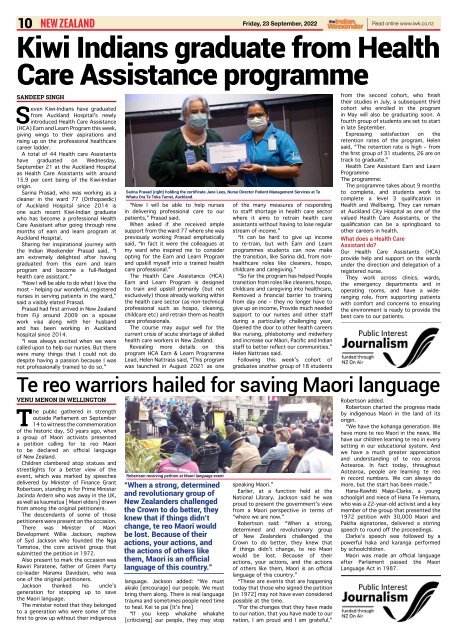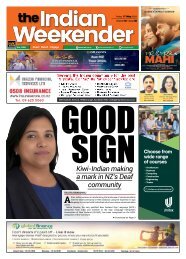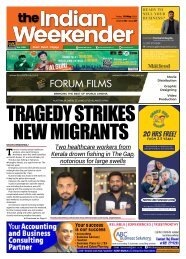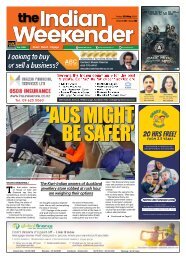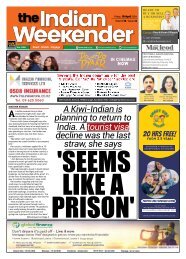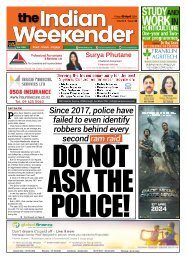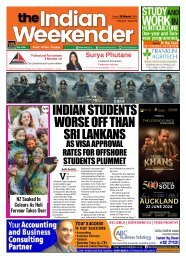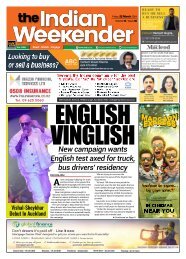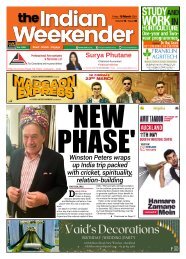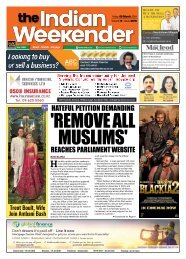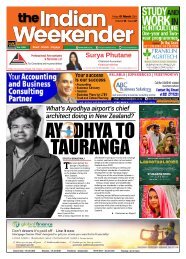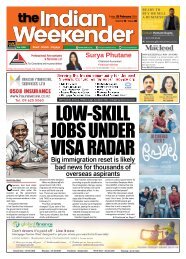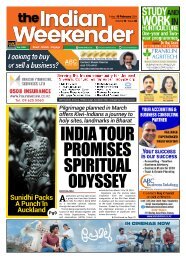India Weekender 23 Sep
- No tags were found...
You also want an ePaper? Increase the reach of your titles
YUMPU automatically turns print PDFs into web optimized ePapers that Google loves.
10<br />
NEW ZEALAND<br />
Friday, <strong>23</strong> <strong>Sep</strong>tember, 2022<br />
Kiwi <strong>India</strong>ns graduate from Health<br />
Care Assistance programme<br />
Read online www.iwk.co.nz<br />
SANDEEP SINGH<br />
Seven Kiwi-<strong>India</strong>ns have graduated<br />
from Auckland Hospital’s newly<br />
introduced Health Care Assistance<br />
(HCA) Earn and Learn Program this week,<br />
giving wings to their aspirations and<br />
rising up on the professional healthcare<br />
career ladder.<br />
A total of 44 Health care Assistants<br />
have graduated on Wednesday,<br />
<strong>Sep</strong>tember 21 at the Auckland Hospital<br />
as Health Care Assistants with around<br />
15.9 per cent being of the Kiwi-<strong>India</strong>n<br />
origin.<br />
Sarina Prasad, who was working as a<br />
cleaner in the ward 77 (Orthopaedic)<br />
of Auckland Hospital since 2014 is<br />
one such recent Kiwi-<strong>India</strong>n graduate<br />
who has become a professional Health<br />
Care Assistant after going through nine<br />
months of earn and learn program at<br />
Auckland Hospital.<br />
Sharing her inspirational journey with<br />
the <strong>India</strong>n <strong>Weekender</strong> Prasad said, “I<br />
am extremely delighted after having<br />
graduated from this earn and learn<br />
program and become a full-fledged<br />
health care assistant.”<br />
“Now I will be able to do what I love the<br />
most – helping our wonderful, registered<br />
nurses in serving patients in the ward,”<br />
said a visibly elated Prasad.<br />
Prasad had first arrived in New Zealand<br />
from Fiji around 2009 on a spouse<br />
work visa along with her husband<br />
and has been working in Auckland<br />
hospital since 2014.<br />
“I was always excited when we were<br />
called upon to help our nurses. But there<br />
were many things that I could not do<br />
despite having a passion because I was<br />
not professionally trained to do so.”<br />
Sarina Prasad (right) holding the certificate Jane Lees, Nurse Director Patient Management Services at Te<br />
Whatu Ora Te Toka Tumei, Auckland.<br />
“Now I will be able to help nurses<br />
in delivering professional care to our<br />
patients,” Prasad said.<br />
When asked if she received ample<br />
support from the ward 77 where she was<br />
previously working Prasad emphatically<br />
said, “In fact it were the colleagues at<br />
my ward who inspired me to consider<br />
opting for the Earn and Learn Program<br />
and upskill myself into a trained health<br />
care professional.”<br />
The Health Care Assistance (HCA)<br />
Earn and Learn Program is designed<br />
to train and upskill primarily (but not<br />
exclusively) those already working within<br />
the health care sector (as non-technical<br />
professional such as hospo, cleaning,<br />
childcare etc) and retrain them as health<br />
care professionals.<br />
The course may augur well for the<br />
current crisis of acute shortage of skilled<br />
health care workers in New Zealand.<br />
Revealing more details on this<br />
program HCA Earn & Learn Programme<br />
Lead, Helen Nattrass said, “This program<br />
was launched in August 2021 as one<br />
of the many measures of responding<br />
to staff shortage in health care sector<br />
where it aims to retrain health care<br />
assistants without having to lose regular<br />
stream of income.”<br />
“It can be hard to give up income<br />
to re-train, but with Earn and Learn<br />
programmes students can now make<br />
the transition, like Sarina did, from nonhealthcare<br />
roles like cleaners, hospo,<br />
childcare and caregiving.”<br />
“So far the program has helped People<br />
transition from roles like cleaners, hospo,<br />
childcare and caregiving into healthcare,<br />
Removed a financial barrier to training<br />
from day one – they no longer have to<br />
give up an income, Provide much needed<br />
support to our nurses and other staff<br />
during a particularly challenging year,<br />
Opened the door to other health careers<br />
like nursing, phlebotomy and midwifery<br />
and increase our Māori, Pacific and <strong>India</strong>n<br />
staff to better reflect our communities.”<br />
Helen Nattrass said.<br />
Following this week’s cohort of<br />
graduates another group of 18 students<br />
from the second cohort, who finish<br />
their studies in July, a subsequent third<br />
cohort who enrolled in the program<br />
in May will also be graduating soon. A<br />
fourth group of students are set to start<br />
in late <strong>Sep</strong>tember.<br />
Expressing satisfaction on the<br />
retention rates of the program, Helen<br />
said, “The retention rate is high – from<br />
the first group of 31 students, 26 are on<br />
track to graduate.”<br />
Health Care Assistant Earn and Learn<br />
Programme<br />
The programme:<br />
The programme takes about 9 months<br />
to complete, and students work to<br />
complete a level 3 qualification in<br />
Health and Wellbeing. They can remain<br />
at Auckland City Hospital as one of the<br />
valued Health Care Assistants, or the<br />
qualification can be a springboard to<br />
other careers in health.<br />
What does a Health Care<br />
Assistant do?<br />
Our Health Care Assistants (HCA)<br />
provide help and support on the wards<br />
under the direction and delegation of a<br />
registered nurse.<br />
They work across clinics, wards,<br />
the emergency departments and in<br />
operating rooms, and have a wideranging<br />
role, from supporting patients<br />
with comfort and concerns to ensuring<br />
the environment is ready to provide the<br />
best care to our patients.<br />
Te reo warriors hailed for saving Maori language<br />
VENU MENON IN WELLINGTON<br />
The public gathered in strength<br />
outside Parliament on <strong>Sep</strong>tember<br />
14 to witness the commemoration<br />
of the historic day, 50 years ago, when<br />
a group of Maori activists presented<br />
a petition calling for te reo Maori<br />
to be declared an official language<br />
of New Zealand.<br />
Children clambered atop statues and<br />
streetlights for a better view of the<br />
event, which was marked by speeches<br />
delivered by Minister of Finance Grant<br />
Robertson, standing in for Prime Minister<br />
Jacinda Ardern who was away in the UK,<br />
as well as kaumatua [ Maori elders] drawn<br />
from among the original petitioners.<br />
The descendants of some of those<br />
petitioners were present on the occasion.<br />
There was Minister of Maori<br />
Development Willie Jackson, nephew<br />
of Syd Jackson who founded the Nga<br />
Tamatoa, the core activist group that<br />
submitted the petition in 1972.<br />
Also present to mark the occasion was<br />
Rawiri Paratene, father of Green Party<br />
co-leader Marama Davidson, who was<br />
one of the original petitioners.<br />
Jackson thanked his uncle’s<br />
generation for stepping up to save<br />
the Maori language.<br />
The minister noted that they belonged<br />
to a generation who were some of the<br />
first to grow up without their indigenous<br />
Robertson receiving petition at Maori language event<br />
“When a strong, determined<br />
and revolutionary group of<br />
New Zealanders challenged<br />
the Crown to do better, they<br />
knew that if things didn’t<br />
change, te reo Maori would<br />
be lost. Because of their<br />
actions, your actions, and<br />
the actions of others like<br />
them, Maori is an official<br />
language of this country.”<br />
language. Jackson added: “We must<br />
akiaki [encourage] our people. We must<br />
bring them along. There is real language<br />
trauma and sometimes people need time<br />
to heal. Kei te pai [It’s fine]<br />
“If you keep whakahe whakahe<br />
[criticising] our people, they may stop<br />
speaking Maori.”<br />
Earlier, at a function held at the<br />
National Library, Jackson said he was<br />
proud to present the government’s view<br />
from a Maori perspective in terms of<br />
“where we are now.”<br />
Robertson said: “When a strong,<br />
determined and revolutionary group<br />
of New Zealanders challenged the<br />
Crown to do better, they knew that<br />
if things didn’t change, te reo Maori<br />
would be lost. Because of their<br />
actions, your actions, and the actions<br />
of others like them, Maori is an official<br />
language of this country.”<br />
“These are events that are happening<br />
today that those who signed the petition<br />
[in 1972] may not have even considered<br />
possible at the time.<br />
"For the changes that they have made<br />
to our nation, that you have made to our<br />
nation, I am proud and I am grateful,”<br />
Robertson added.<br />
Robertson charted the progress made<br />
by indigenous Maori in the land of its<br />
origin.<br />
“We have the kohanga generation. We<br />
have more te reo Maori in the news. We<br />
have our children learning te reo in every<br />
setting in our educational system. And<br />
we have a much greater appreciation<br />
and understanding of te reo across<br />
Aotearoa. In fact today, throughout<br />
Aotearoa, people are learning te reo<br />
in record numbers. We can always do<br />
more, but the start has been made.”<br />
Hana-Rawhiti Maipi-Clarke, a young<br />
schoolgirl and niece of Hana Te Hemara,<br />
who was a 22-year-old activist and a key<br />
member of the group that presented the<br />
1972 petition with 30,000 Maori and<br />
Pakiha signatories, delivered a stirring<br />
speech to round off the proceedings.<br />
Clarke’s speech was followed by a<br />
powerful haka and karanga performed<br />
by schoolchildren.<br />
Maori was made an official language<br />
after Parliament passed the Maori<br />
Language Act in 1987.


